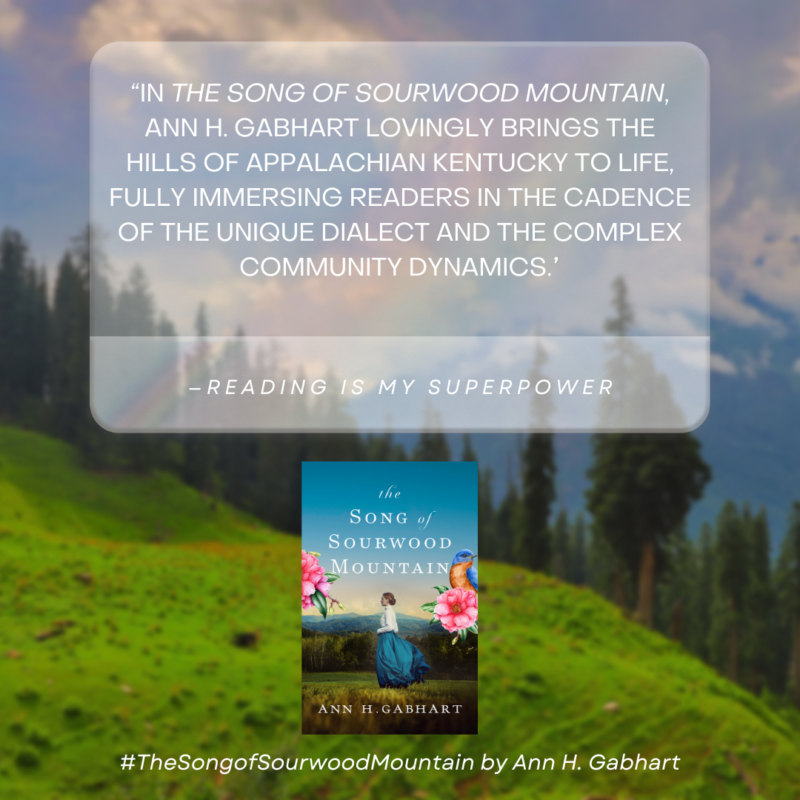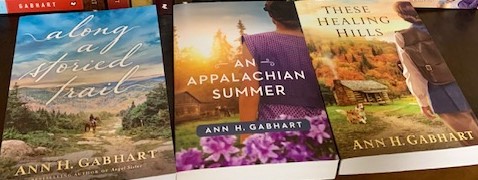 One of the things I’ve enjoyed when I head to the hills for a new story is being able to hear my characters talking. I grew up country. Not mountain. But many of the expressions I’ve come across when researching for my Appalachian stories rang with familiarity for me because I’d heard them pert-nigh (pretty near) all my life.
One of the things I’ve enjoyed when I head to the hills for a new story is being able to hear my characters talking. I grew up country. Not mountain. But many of the expressions I’ve come across when researching for my Appalachian stories rang with familiarity for me because I’d heard them pert-nigh (pretty near) all my life.
I had a message from Karen today. She’d just finished reading The Song of Sourwood Mountain. She had liked seeing some of the mountain lingo in the story. She said she’d never forgotten an elementary teacher telling a friend who had said pert-near that she should say “pretty near” instead. I suppose the way I had always heard it with the nigh instead of near was the same. Somebody would ask if supper was ready and the answer might be pert-nigh in my house. Or that we had pert-nigh finished this or that chore.
Here are some other words I found while researching mountain lingo that echoed from my own growing up years. If a person said something was sorry, they weren’t talking about any kind of apology. They were talking about a person or thing having little or no value. If you had something hidden away, you might say it was in the ‘tator hole. That’s where mountain people kept their potatoes and other root vegetables when they didn’t have a cellar. Just a place under the cabin floor.
I certainly knew what the “wish book” was. My sister and I looked forward to getting that Sears Roebuck Christmas catalog in the mail so that we could start dreaming of the things we might hope to find under our cedar Christmas tree. We did more dreaming than getting, but dreaming can be fun.
I’ve heard people say a shed was slaunchwise too. That meant it was leaning. But other things could be slaunchwise too. Plenty of times I heard this or that adult say things were in a gaum. That was a mess you hoped you wouldn’t have to fix. It would be better to have to go pick a little jag of berries. A jag was a small amount but for some reason I always remember folks adding the little in front of jag.
If something needed hammering or chopping, a person might make a lick with a hammer or axe. Of course, if a person would rather laze around in the shade instead of hitting a lick of work, they might get talked about.
 Poke is one of the expressions I’ve used in all my Appalachian stories, but it wasn’t one I heard often when I was a kid. A poke is a small bag in mountain lingo. Another I liked using in my stories – I think I had Perdita Sweet saying it in Along a Storied Trail – was “poor do” for what she had to eat. That was boiled cornmeal. My mother always called it mush, and I liked it with some butter and salt. But we always had plenty of better fixin’s for dinner and supper than Aunt Perdie had when things weren’t going well for her.
Poke is one of the expressions I’ve used in all my Appalachian stories, but it wasn’t one I heard often when I was a kid. A poke is a small bag in mountain lingo. Another I liked using in my stories – I think I had Perdita Sweet saying it in Along a Storied Trail – was “poor do” for what she had to eat. That was boiled cornmeal. My mother always called it mush, and I liked it with some butter and salt. But we always had plenty of better fixin’s for dinner and supper than Aunt Perdie had when things weren’t going well for her.
The same as those in the mountains, we had plenty of varmints out on the farm trying to catch our hens or eat our garden produce. At times, I heard someone call a person who had done something bad as an onery varmint.
I said somebody was onery the other day to a 12 year old and she thought it was the funniest thing. She’d never heard the word. Guess nobody had ever told her she was onery if she was reluctant to go feed those chickens or carry in the wood. I’m thinking she’s never had the pleasure of doing either of those chores.
In my mountain books, I’ve talked about tides, mountain lingo for floods. Flower gardens were blossom patches and vegetable gardens were sass patches. One of the expressions I loved to use because of how poetic it sounds is “the edge of dark” for late afternoon.
I’m fixing to (another country expression for getting ready to) start researching for a new mountain story. I’ll have to create some new people to do my mountain talking for me.
What country/mountain expressions do you say or hear?